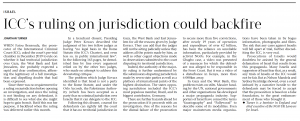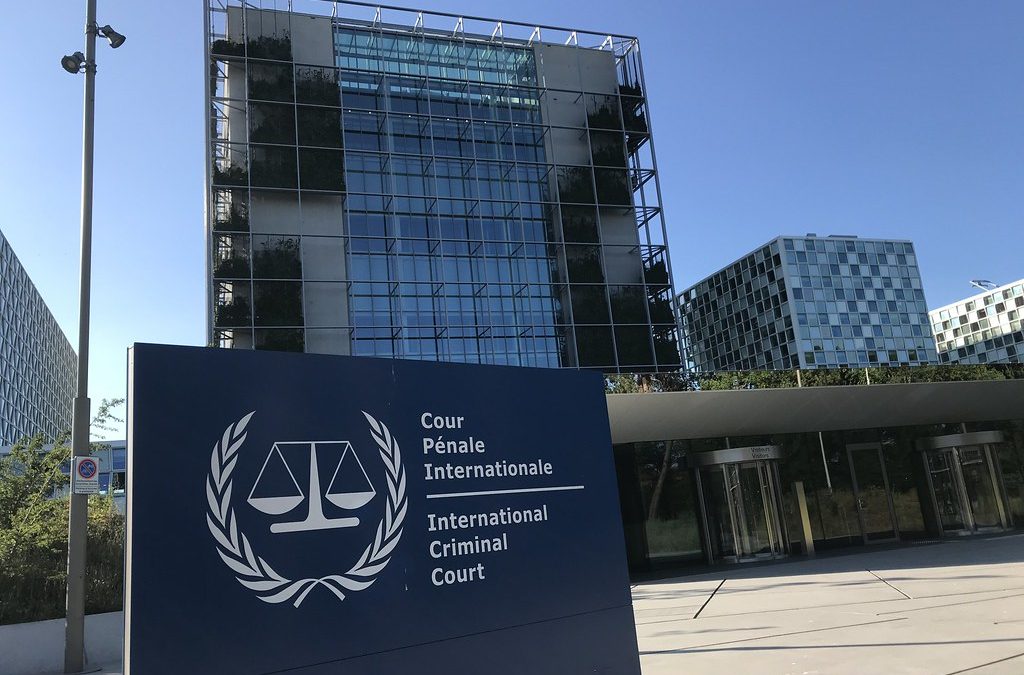International Criminal Court
Ruling on Jurisdiction May Backfire
As published in the Insider, Independent Media Publication, Sunday 28 Feb 2021
Jonathan Turner*
When Fatou Bensouda, the Prosecutor of the International Criminal Court (ICC), asked the Court’s Pre-Trial Chamber in December 2019 to rule on whether it had territorial jurisdiction over Gaza, the West Bank and East Jerusalem, she probably expected a rapid and clear confirmation, affirming the legitimacy of a full investigation and dispelling doubts that had been expressed.
Since there was no requirement for a ruling on jurisdiction before opening an investigation, and since the ruling is not binding on any defendant, it is difficult to see what else she might hope to gain from it. But if this was her purpose, it backfired when the ruling was eventually delivered earlier this month.
In a trenchant dissent, Presiding Judge Peter Kovacs described the judgment of his two fellow Judges as having “no legal basis in the Rome Statute [the ICC’s Charter], and even less so, in public international law”. In the following 163 pages he demolished line by line every argument relied on by the other two Judges, who made no attempt to address this devastating critique.
The central problem which Judge Kovacs identified is that Israel is not a party to the Rome Statute and under the Oslo Accords the Palestinian Authority (which has been accepted as a party) has no criminal jurisdiction over Israelis that it can delegate to the ICC.
Following this dissent, counsel for defendants can rightly tell the Court that it has no territorial jurisdiction in Gaza, the West Bank and East Jerusalem for all the reasons given by Judge Kovacs. They can add that the Judges will not be acting judicially unless they address all the points made by him, as well as other cogent objections made in observations submitted to the Court disputing its territorial jurisdiction.
Indeed, the authority of the majority ruling is further undermined by the submissions disputing jurisdiction made by seven state parties as well as a plethora of international jurists of the highest distinction. The states opposing jurisdiction included the ICC’s most populous member, Brazil, and its biggest contributor, Germany.
There are further hazards ahead for the prosecution if it proceeds with an investigation. One of the reasons for the dismal failure of the prosecution to secure more than five convictions, after nearly 19 years of operation and expenditure of over 2 billion Euros, has been reliance on unreliable information, particularly provided by activist NGOs. For example, in the Gbagbo case, a video was presented of a massacre for which the defendant was alleged to be responsible in the Ivory Coast. But it was a video of a disturbance in Kenya, over 6000 km away.
In Gaza and the West Bank, this problem exists on stilts. Massive funding by the UN, national governments and other organisations has developed a major propaganda industry. Supporters of Israel have coined the terms “fauxtography” and “Pallywood” to describe some of its modalities. Even major mainstream media organisations have been taken in by bogus information, photographs and films. The risk that any cases against Israelis will fall apart at trial, further discrediting the ICC, is very real.
Prosecutions of Israelis would doubtless be assisted by the general defamation of Israel that results from this propaganda. Many Israelis and supporters of Israel rightly fear that, as a result, any trials of Israelis at the ICC would not be fair. But as Nelson Mandela and Sydney Kentridge showed, even a Court imbued by a narrative hostile to the defendants may be forced to accept that the prosecution is based on a false foundation, to the great embarrassment of those who brought it.
*Jonathan Turner is a Barrister in England and Chief Executive of the NGO, UK Lawyers for Israel



